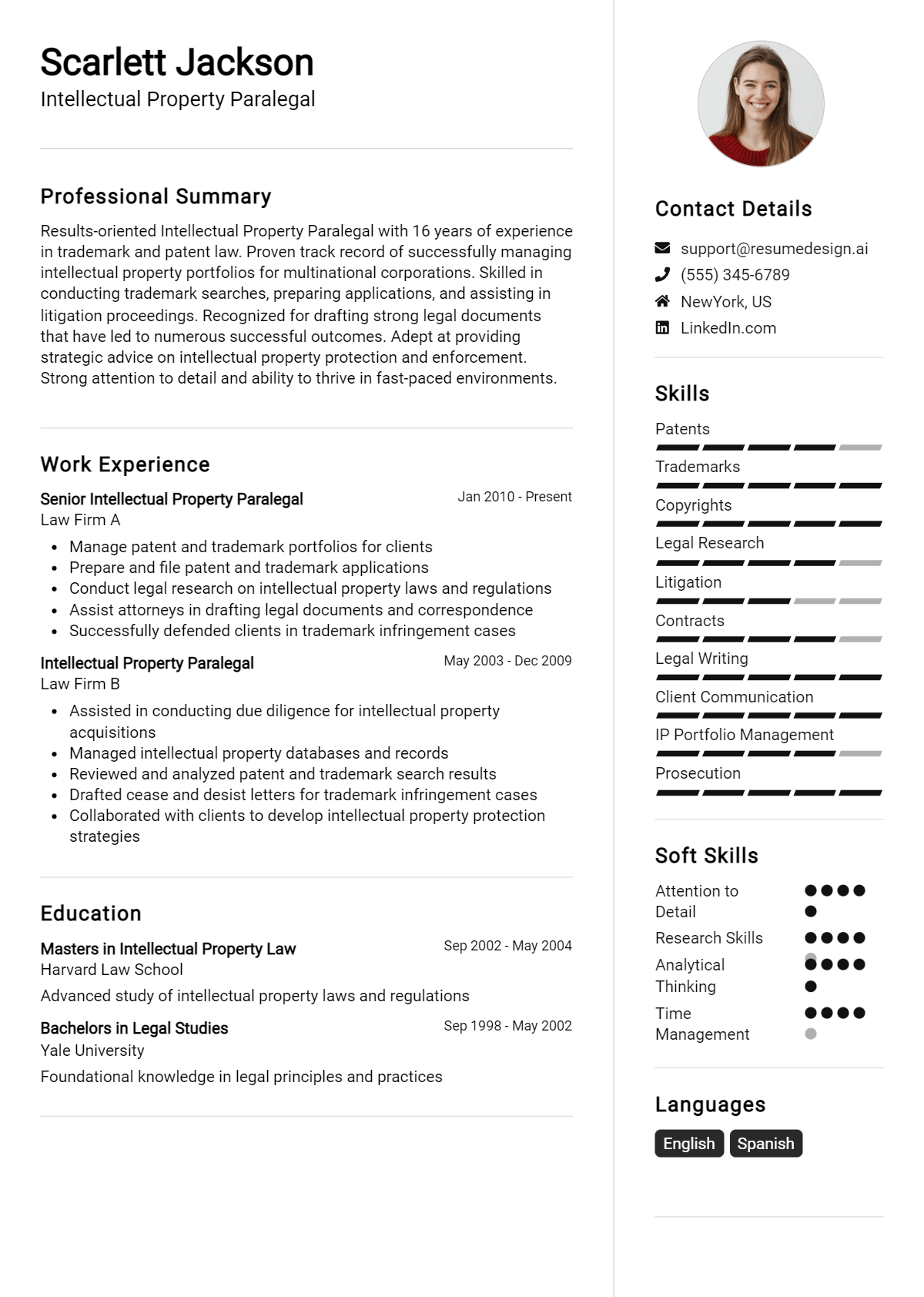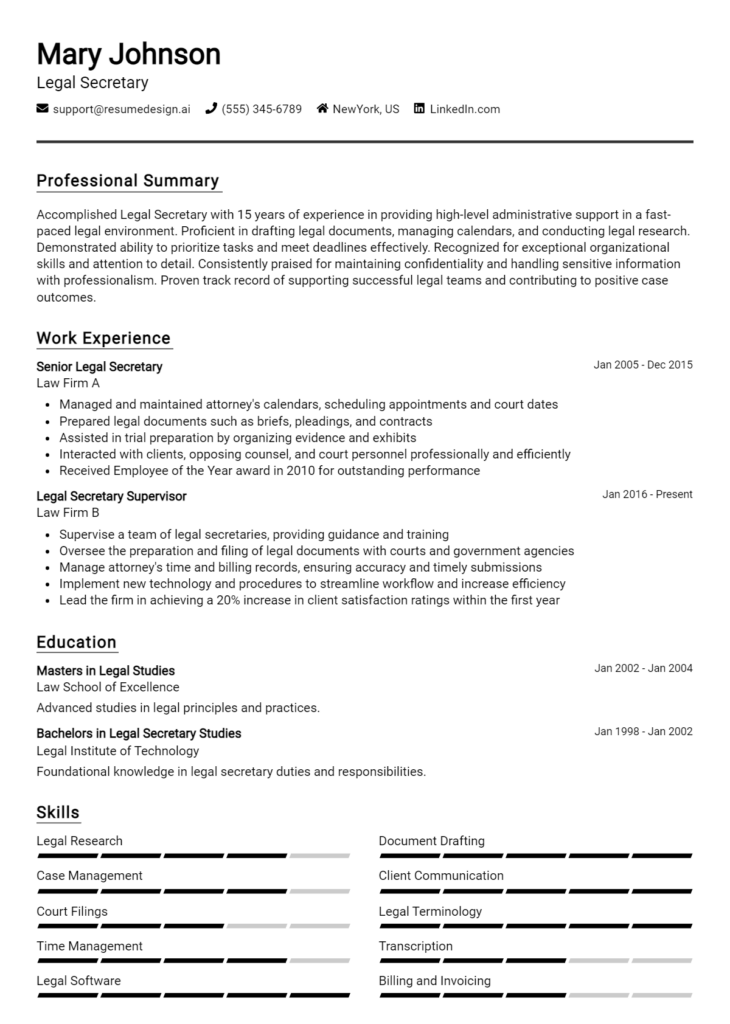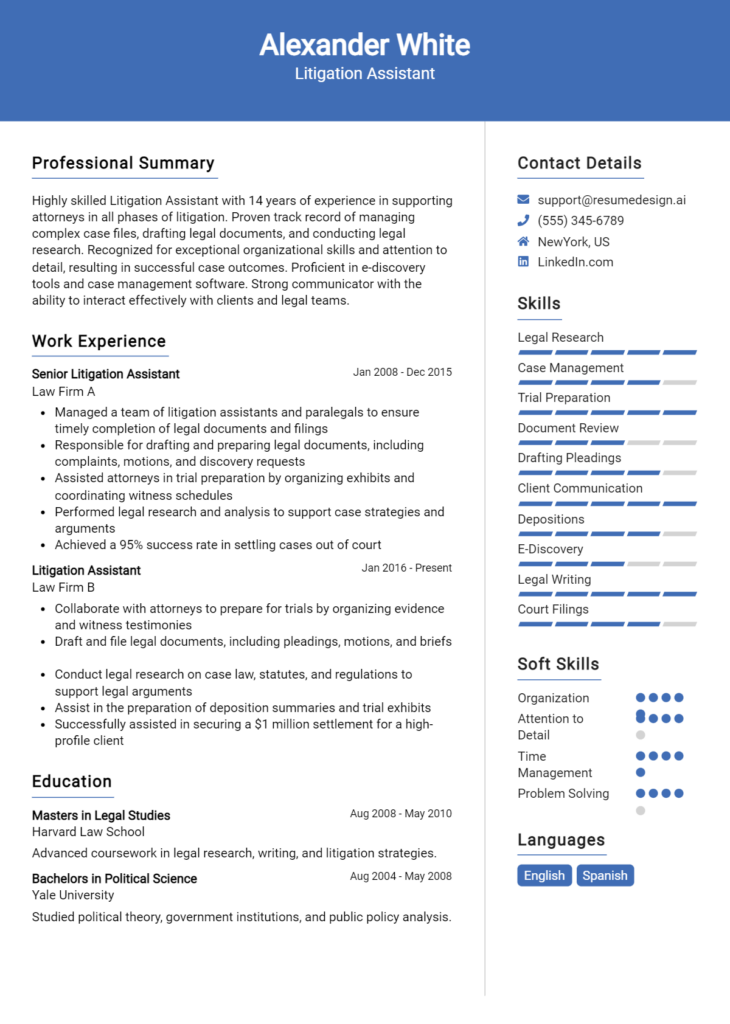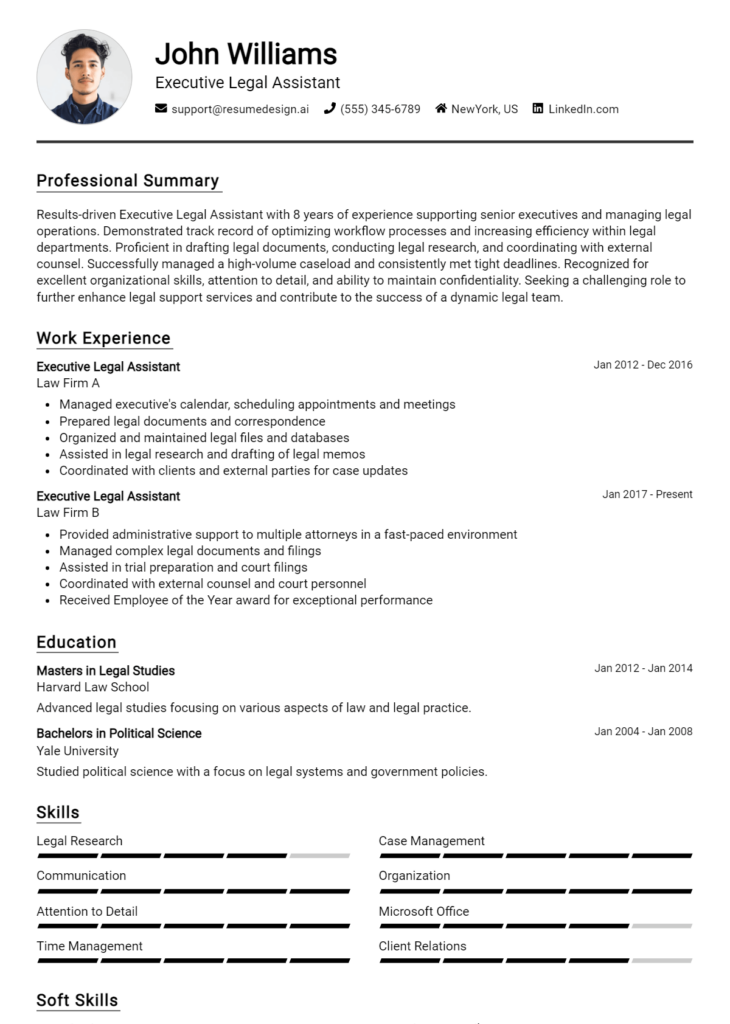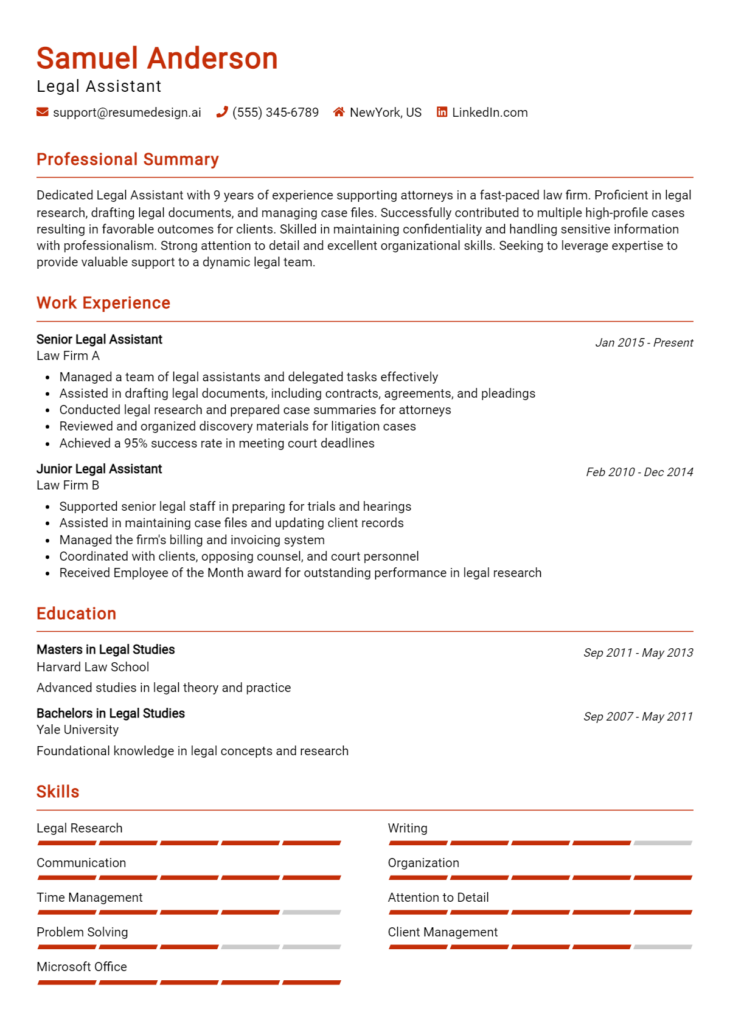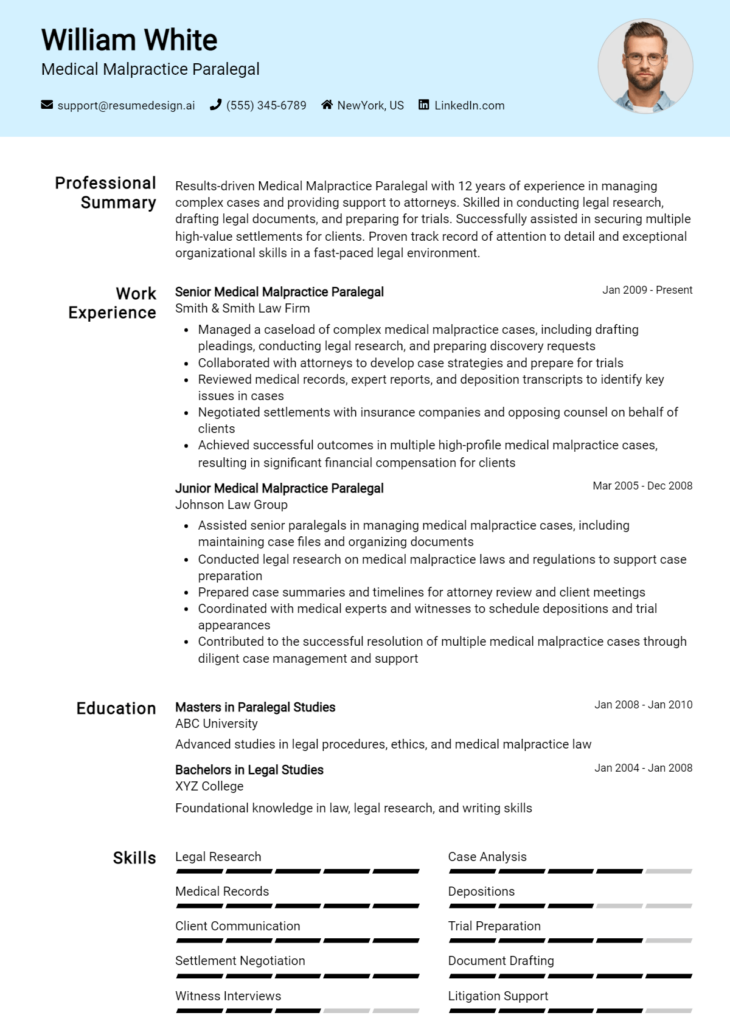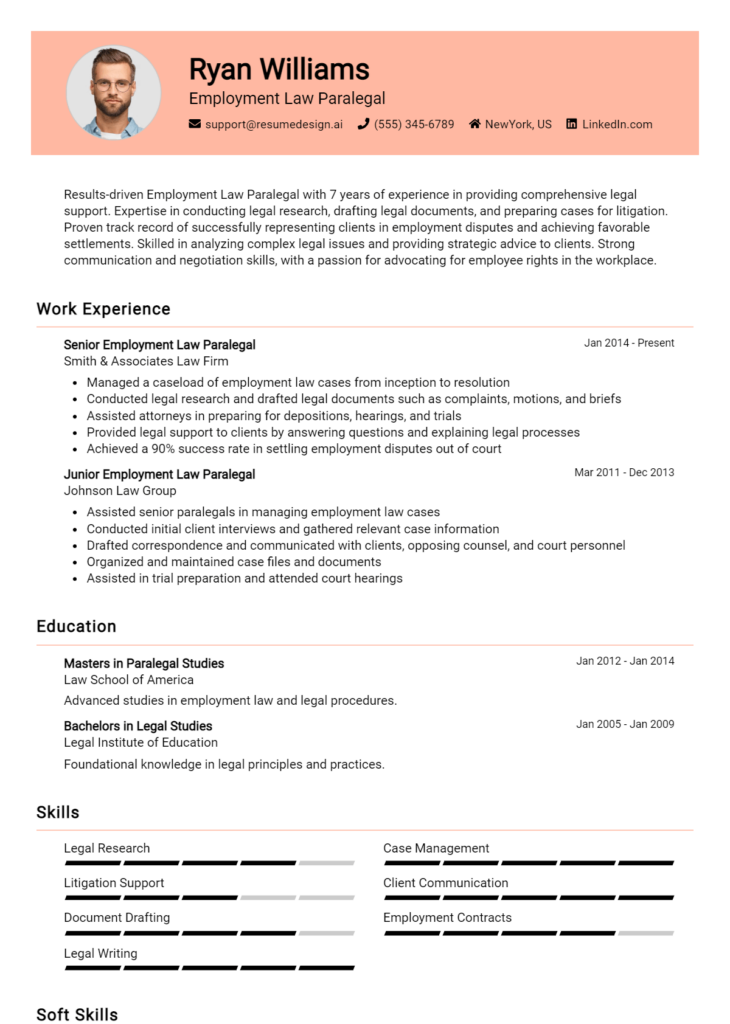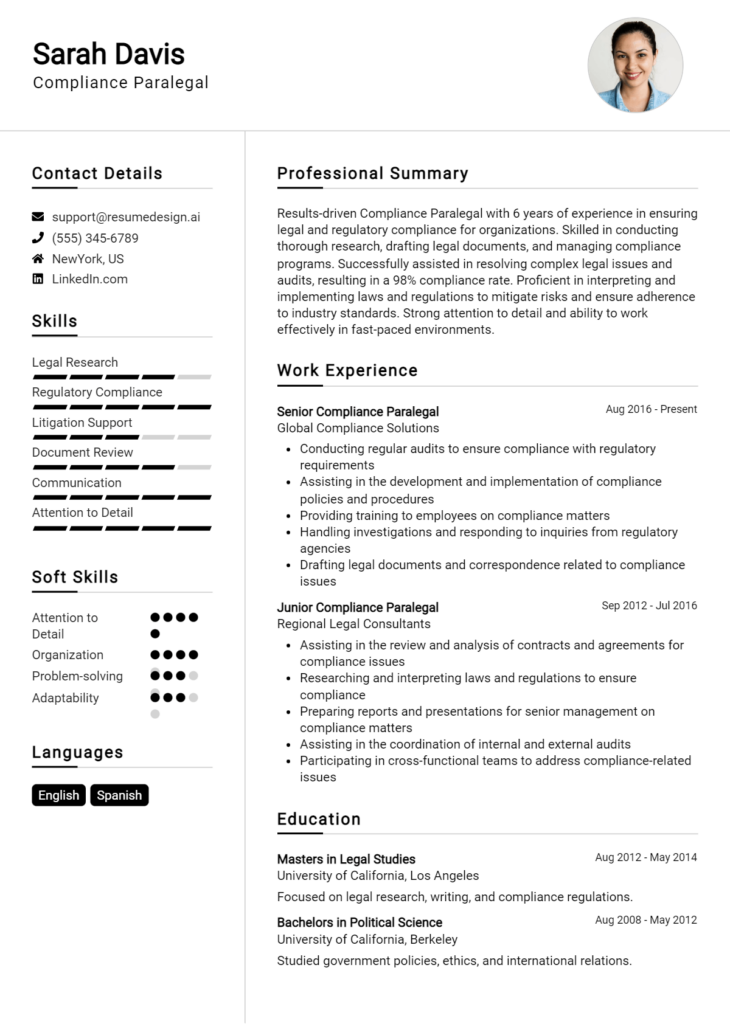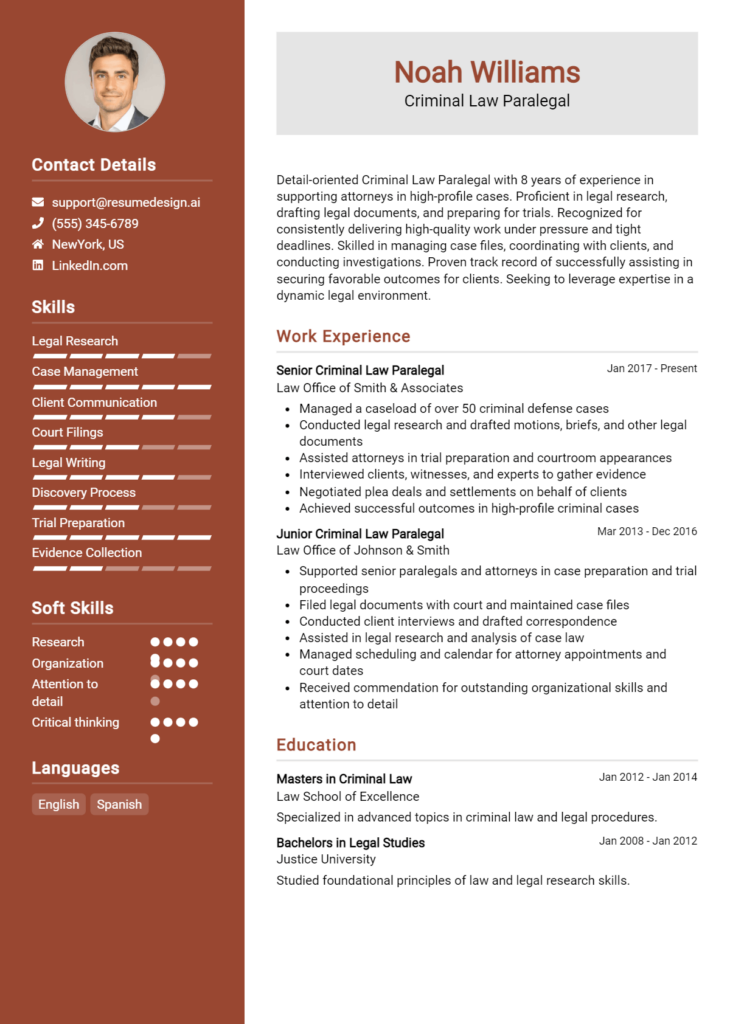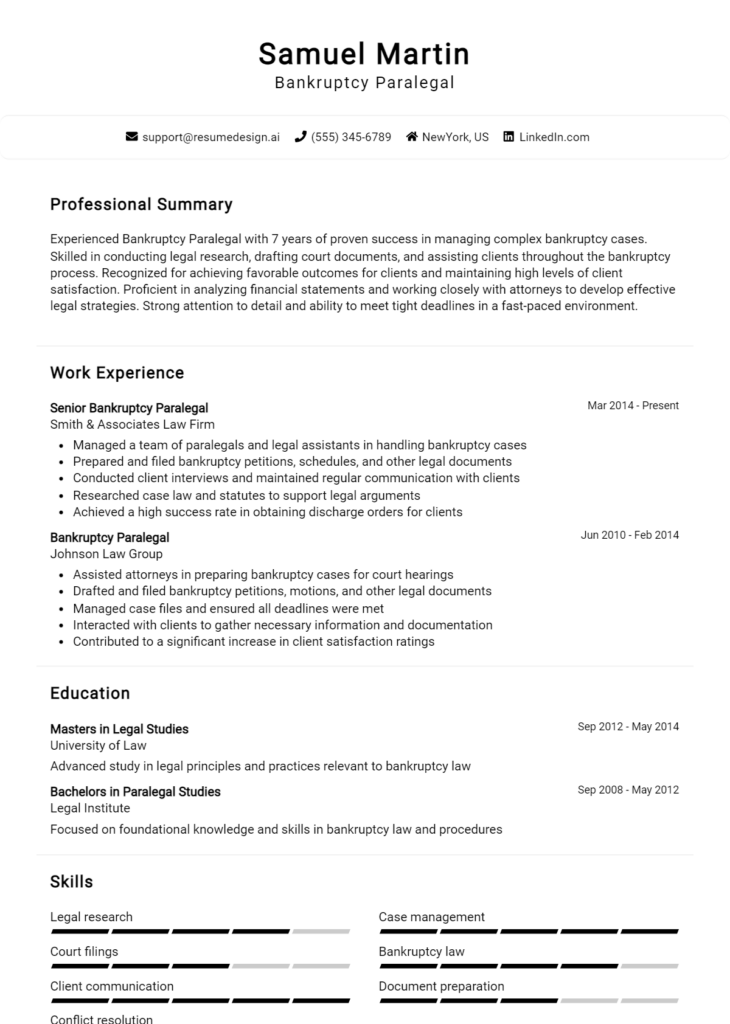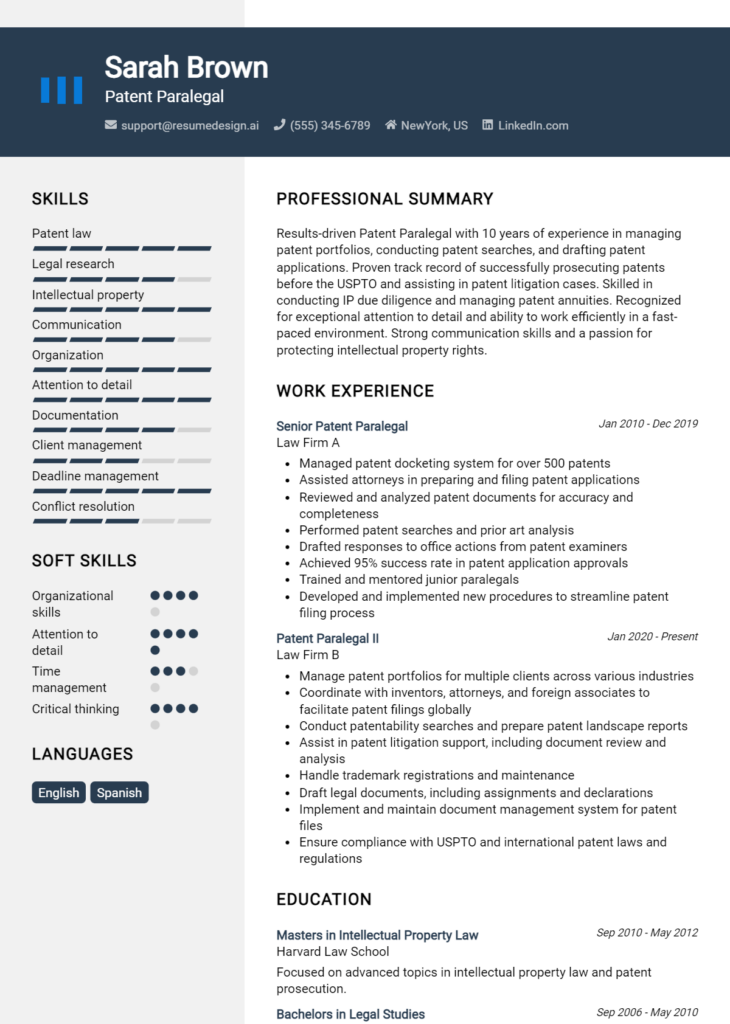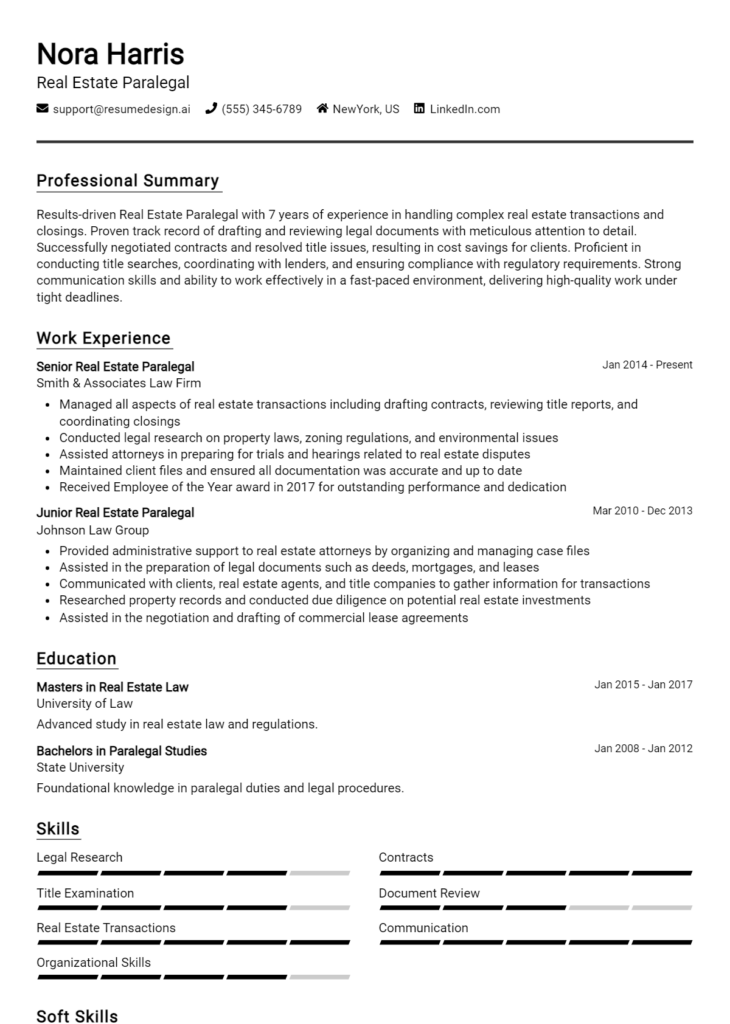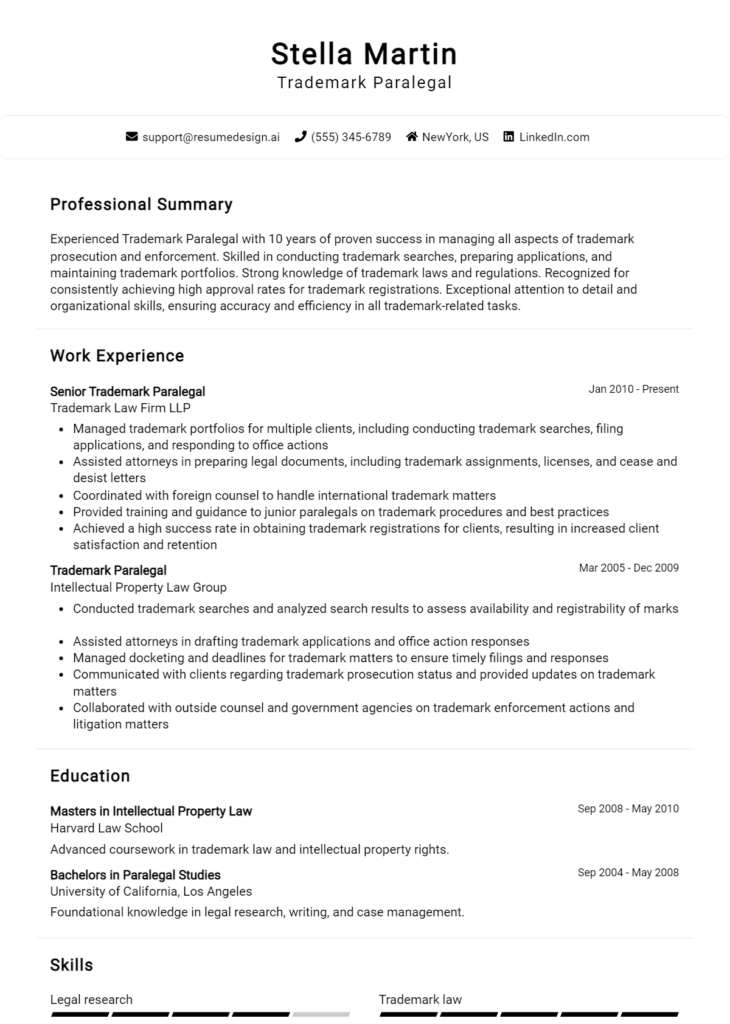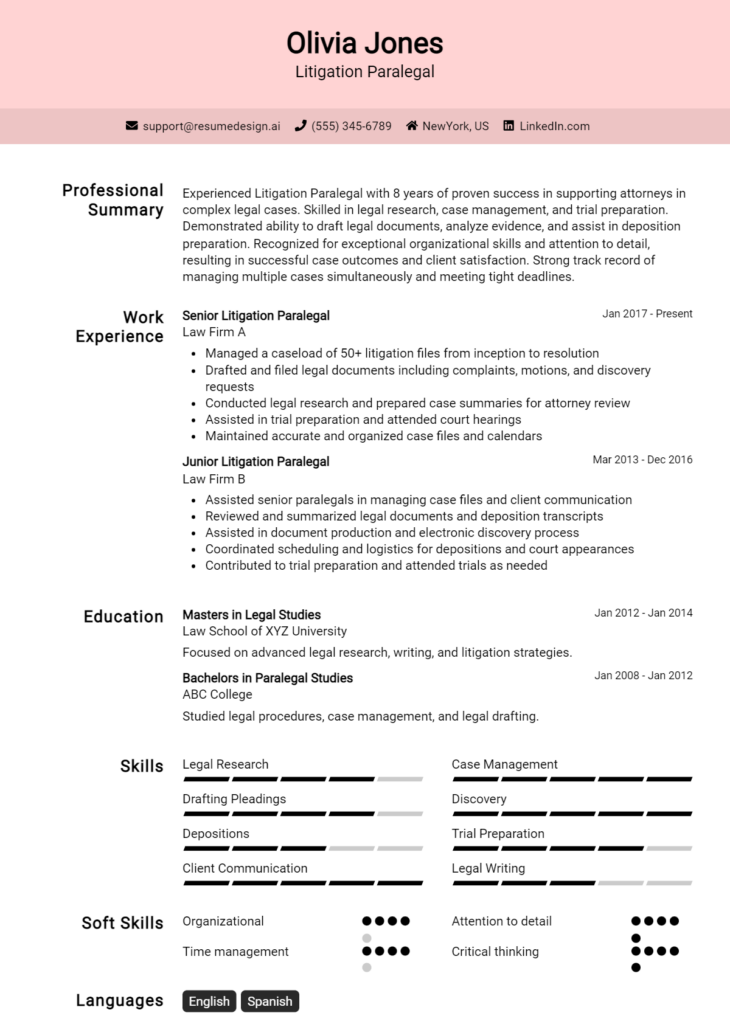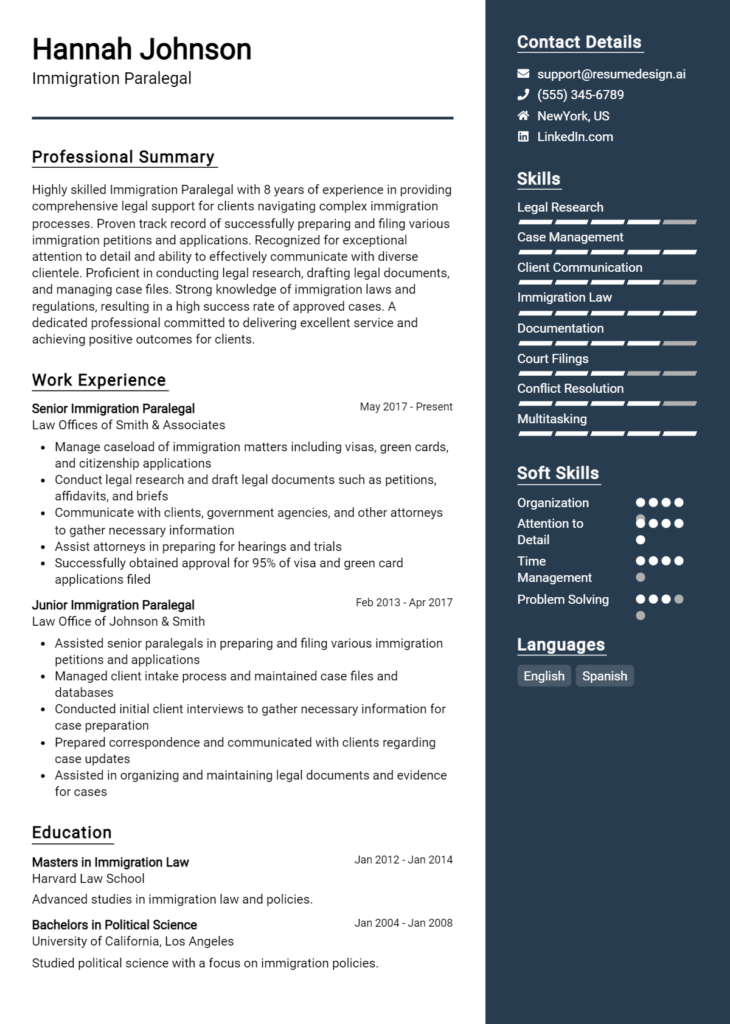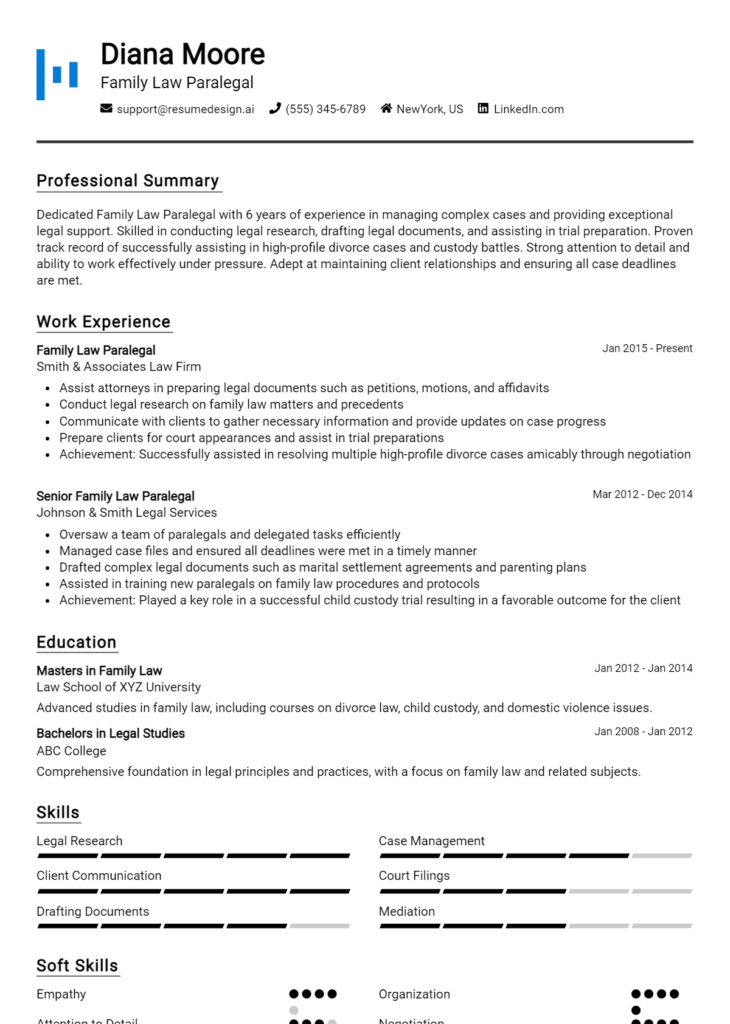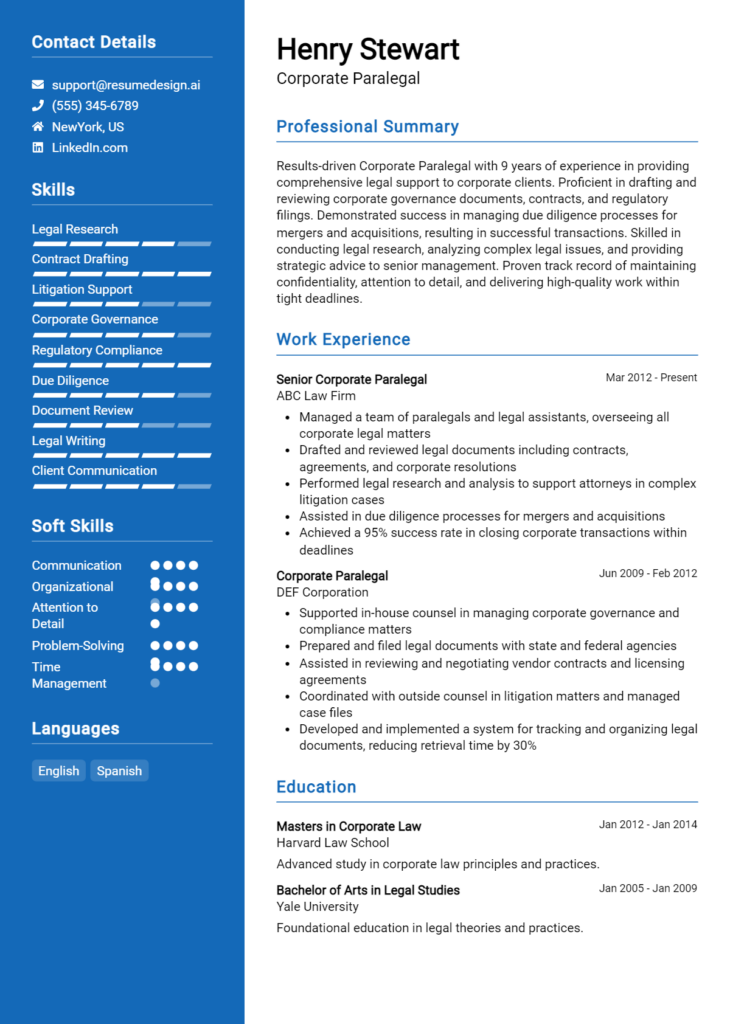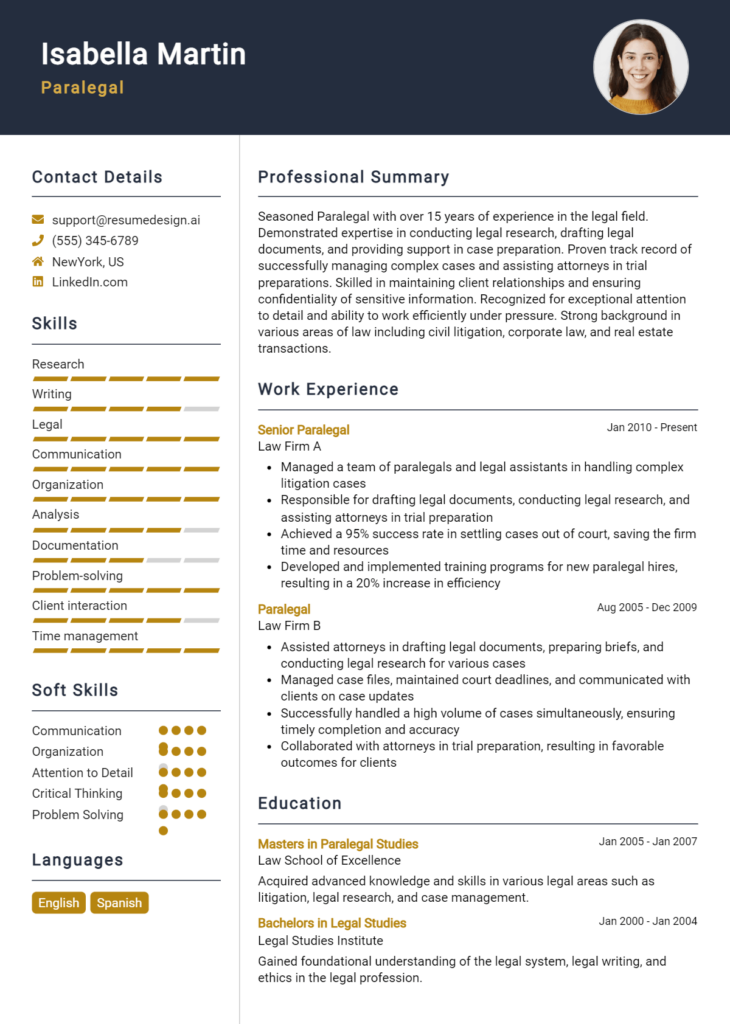Intellectual Property Paralegal Core Responsibilities
An Intellectual Property Paralegal plays a vital role in supporting legal teams by managing various aspects of intellectual property (IP) law, including trademark and patent filings, research, and documentation. This position requires strong technical skills, operational efficiency, and problem-solving abilities to bridge communication between legal, marketing, and product development departments. A well-structured resume that highlights these qualifications is essential, as it showcases the candidate's ability to contribute to the organization's overall goals by ensuring compliance and protecting valuable assets.
Common Responsibilities Listed on Intellectual Property Paralegal Resume
- Assist in the preparation and filing of trademark and patent applications.
- Conduct trademark searches and analyze the results.
- Maintain and update IP databases and records.
- Draft and review legal documents related to IP transactions.
- Coordinate with external counsel on IP matters.
- Monitor deadlines for IP filings and renewals.
- Prepare reports and summaries for legal teams.
- Assist in IP litigation support and discovery processes.
- Research relevant laws and regulations affecting IP rights.
- Communicate with clients regarding IP issues and updates.
- Prepare and manage licensing agreements.
- Assist in the development of internal IP policies and procedures.
High-Level Resume Tips for Intellectual Property Paralegal Professionals
In the competitive field of Intellectual Property Law, a well-crafted resume is essential for standing out among a pool of candidates. As the first impression you make on potential employers, your resume should not only showcase your skills and achievements but also demonstrate your familiarity with the nuances of intellectual property law. A strong resume can effectively communicate your qualifications and passion for the role, paving the way for interviews and career advancement. This guide will provide practical and actionable resume tips specifically tailored for Intellectual Property Paralegal professionals, helping you present your best self to prospective employers.
Top Resume Tips for Intellectual Property Paralegal Professionals
- Tailor your resume to match the job description, using keywords and phrases that reflect the specific requirements of the position.
- Highlight relevant experience in intellectual property law, including any internships, roles, or projects that demonstrate your expertise.
- Quantify your achievements where possible, such as the number of cases you assisted with or the amount of revenue generated through successful IP filings.
- Showcase industry-specific skills, such as knowledge of patent filing processes, trademark registration, and IP litigation support.
- Include certifications or training related to intellectual property law, such as a paralegal certificate or specialized IP courses.
- Organize your resume with clear headings and bullet points to ensure easy readability for hiring managers.
- Utilize action verbs to convey your responsibilities and accomplishments, such as "assisted," "drafted," or "coordinated."
- Consider adding a professional summary at the top of your resume that encapsulates your career goals and relevant experience in intellectual property.
- Keep your resume concise, ideally one page, focusing on the most relevant information to capture the employer's attention quickly.
By implementing these tips, you can significantly enhance your resume and increase your chances of landing a job in the Intellectual Property Paralegal field. A polished and targeted resume not only highlights your qualifications but also reflects your commitment and professionalism, making you a compelling candidate in the eyes of potential employers.
Why Resume Headlines & Titles are Important for Intellectual Property Paralegal
In the competitive field of intellectual property law, a well-crafted resume headline or title serves as a vital first impression for candidates applying for the role of an Intellectual Property Paralegal. A strong headline can immediately capture the attention of hiring managers, succinctly summarizing a candidate's key qualifications and unique strengths in just a few impactful words. This concise and relevant phrase allows hiring managers to quickly gauge the candidate’s fit for the position, making it an essential element of a successful resume. By directly relating to the job being applied for, a compelling headline sets the tone for the rest of the application and can significantly enhance the chances of being noticed in a crowded applicant pool.
Best Practices for Crafting Resume Headlines for Intellectual Property Paralegal
- Keep it concise: Aim for one impactful phrase, ideally 5-10 words.
- Be role-specific: Tailor your headline to reflect the specific position of Intellectual Property Paralegal.
- Highlight key skills: Incorporate essential skills or areas of expertise relevant to intellectual property law.
- Showcase experience: If applicable, mention years of experience or notable achievements.
- Use action-oriented language: Employ strong verbs to convey confidence and proactivity.
- Avoid clichés: Steer clear of overused phrases that lack specificity or uniqueness.
- Reflect your unique value: Summarize what sets you apart from other candidates.
- Proofread for clarity: Ensure your headline is free of errors and easy to understand.
Example Resume Headlines for Intellectual Property Paralegal
Strong Resume Headlines
Results-Driven Intellectual Property Paralegal with 5+ Years of Experience
Detail-Oriented Paralegal Specializing in Patent Law & Trademark Protection
Experienced Intellectual Property Paralegal | Expertise in Copyright and Trade Secrets
Proficient IP Paralegal with Proven Track Record in Managing Complex Cases
Weak Resume Headlines
Paralegal Seeking Job
Experienced Professional in Law
Intellectual Property Worker
The strong resume headlines effectively communicate the candidate's qualifications and specialization in intellectual property law, using specific language that resonates with hiring managers. They highlight relevant experience, skills, and value, making it easy for employers to see the candidate’s fit for the role at a glance. In contrast, the weak headlines lack specificity and do not convey any unique strengths or qualifications, making them forgettable and less likely to stand out in a competitive job market.
Writing an Exceptional Intellectual Property Paralegal Resume Summary
In the competitive field of intellectual property law, a well-crafted resume summary is crucial for paralegals seeking to make a lasting impression on hiring managers. This concise section serves as an elevator pitch, encapsulating the candidate's key skills, experience, and accomplishments tailored to the specific job they are applying for. A strong resume summary quickly captures attention, highlighting relevant expertise in areas such as patent law, trademark registration, or copyright issues, and sets the tone for the rest of the resume. When crafted effectively, it can significantly enhance a candidate's chances of moving forward in the hiring process.
Best Practices for Writing a Intellectual Property Paralegal Resume Summary
- Quantify achievements to demonstrate impact, such as the number of cases managed or the success rate of filings.
- Focus on relevant skills, including research proficiency, document preparation, and knowledge of intellectual property laws.
- Tailor the summary to align with the specific job description, using keywords from the posting.
- Keep it concise, ideally within 3-5 sentences, ensuring clarity and brevity.
- Highlight unique accomplishments that set you apart from other candidates, such as certifications or specialized training.
- Use active language to convey confidence and decisiveness in your abilities.
- Avoid jargon or overly technical language that may not resonate with all hiring managers.
- Ensure it reflects your professional persona and matches the tone of the job environment.
Example Intellectual Property Paralegal Resume Summaries
Strong Resume Summaries
Detail-oriented Intellectual Property Paralegal with over 5 years of experience in patent and trademark law. Successfully managed over 100 patent applications, achieving a 95% approval rate, while streamlining documentation processes that reduced filing time by 30%.
Dynamic and proactive IP paralegal with a proven track record in trademark registration and enforcement, leading to a 40% increase in client satisfaction. Proficient in conducting thorough trademark searches and preparing comprehensive legal documents.
Results-driven Intellectual Property Paralegal with extensive knowledge of copyright law and a strong background in litigation support. Contributed to a 20% reduction in case resolution time by implementing a more efficient document management system.
Weak Resume Summaries
Paralegal with experience in intellectual property law looking for a new opportunity. I have worked on various cases and am familiar with legal documents.
Dedicated professional seeking a position as an Intellectual Property Paralegal. I have skills in research and documentation but need to gain more specific experience in IP law.
The strong resume summaries stand out due to their specificity, quantifiable achievements, and relevance to the intellectual property paralegal role. They highlight measurable outcomes and specialized skills, which demonstrate the candidate's ability to contribute effectively. In contrast, the weak summaries lack detail, fail to provide any quantifiable results, and come across as generic, which diminishes their impact in a competitive job market.
Work Experience Section for Intellectual Property Paralegal Resume
The work experience section of an Intellectual Property Paralegal resume is crucial as it highlights the candidate's technical skills, ability to manage teams, and capability to deliver high-quality products. This section serves as a platform for potential employers to evaluate how well the candidate's past roles align with the demands of the position they are applying for. By quantifying achievements and demonstrating alignment with industry standards, candidates can effectively illustrate their value and expertise in handling intellectual property matters, showcasing their readiness to contribute to the success of their future employers.
Best Practices for Intellectual Property Paralegal Work Experience
- Highlight relevant technical skills such as patent searching, trademark registration, and legal research.
- Quantify achievements with specific metrics, such as the number of patents filed or cases managed.
- Use action verbs to demonstrate initiative and leadership in projects or team settings.
- Showcase collaboration with attorneys, clients, and external parties to emphasize teamwork.
- Align your experiences with the specific requirements of the job description.
- Include examples of successful case management or project completions.
- Demonstrate familiarity with intellectual property laws and regulations.
- Provide context for your contributions to help employers understand your impact.
Example Work Experiences for Intellectual Property Paralegal
Strong Experiences
- Successfully managed a portfolio of over 200 patents, leading to a 15% increase in client satisfaction scores as measured by post-service surveys.
- Collaborated with attorneys and clients to prepare and file trademark applications, resulting in a 30% reduction in processing time.
- Conducted comprehensive IP audits for five major clients, identifying potential infringement issues and recommending strategies that saved clients an estimated $250,000 in potential litigation costs.
- Trained and mentored a team of three junior paralegals, enhancing their skills and improving overall team efficiency by 20%.
Weak Experiences
- Helped with paperwork for intellectual property cases.
- Assisted attorneys in various tasks as needed.
- Participated in filing documents related to patents and trademarks.
- Worked on several projects during my time at the firm.
The examples of strong experiences are considered effective because they are specific, quantifiable, and demonstrate a clear impact on team performance and client outcomes. They provide concrete evidence of the candidate's capabilities in managing IP portfolios, collaborating with legal teams, and delivering measurable results. In contrast, the weak experiences are vague and lack detail, failing to convey the candidate's actual contributions or achievements, which diminishes their overall impact on the resume.
Education and Certifications Section for Intellectual Property Paralegal Resume
The education and certifications section of an Intellectual Property Paralegal resume plays a crucial role in showcasing a candidate's academic foundation and professional qualifications. This section highlights not only the candidate's degree and relevant coursework but also any industry-recognized certifications and ongoing education efforts. By providing detailed information about specialized training and certifications, candidates can significantly enhance their credibility and demonstrate their commitment to staying current in the ever-evolving field of intellectual property law. This emphasis on formal education and continuous learning ensures that the candidate's qualifications align closely with the demands of the job role, making them a more attractive prospect to potential employers.
Best Practices for Intellectual Property Paralegal Education and Certifications
- List degrees and certifications that are directly relevant to intellectual property law.
- Include the name of the institution and the date of completion for each educational achievement.
- Highlight any specialized training or advanced coursework related to intellectual property.
- Prioritize industry-recognized certifications, such as those from professional paralegal associations.
- Use bullet points for clarity and organization, making it easy for hiring managers to scan.
- Consider adding a brief description of key coursework that relates to intellectual property practices.
- Update this section regularly to reflect new educational achievements and certifications.
- Tailor the education and certifications listed to fit the specific job description being applied for.
Example Education and Certifications for Intellectual Property Paralegal
Strong Examples
- Bachelor of Arts in Legal Studies, University of California, Los Angeles, 2022
- Certified Paralegal (CP), National Association of Legal Assistants, 2023
- Intellectual Property Law Certificate, Harvard University Extension School, 2021
- Coursework in Patent Law and Trademark Registration, University of California, Berkeley, 2020
Weak Examples
- Associate of Arts in General Studies, Community College, 2015
- Certificate in Business Management, Online Learning Platform, 2020
- Bachelor of Science in Biology, University of Florida, 2018
- Outdated Certified Legal Assistant (CLA) credential, 2016
The strong examples listed above are considered relevant and impactful because they reflect degrees and certifications that are directly aligned with the requirements of an Intellectual Property Paralegal role. They showcase a commitment to the field through specialized education and recognized credentials, which enhances the candidate's professional standing. Conversely, the weak examples highlight qualifications that lack direct relevance to intellectual property law or are outdated, which may diminish the candidate's appeal to potential employers seeking specific expertise in this area.
Top Skills & Keywords for Intellectual Property Paralegal Resume
An effective resume for an Intellectual Property Paralegal is crucial for showcasing your qualifications and standing out in a competitive job market. Highlighting the right skills can significantly bolster your chances of landing an interview. Employers seek candidates who not only possess technical expertise but also demonstrate strong interpersonal abilities that are essential for collaboration and communication in a legal environment. By incorporating relevant skills, both hard and soft, into your resume, you can create a compelling narrative that reflects your capabilities and aligns with the demands of the role.
Top Hard & Soft Skills for Intellectual Property Paralegal
Soft Skills
- Attention to Detail
- Strong Communication Skills
- Analytical Thinking
- Problem-Solving Abilities
- Time Management
- Team Collaboration
- Adaptability
- Customer Service Orientation
- Ethical Judgment
- Organizational Skills
- Research Proficiency
- Conflict Resolution
- Critical Thinking
- Active Listening
- Interpersonal Skills
Hard Skills
- Knowledge of Intellectual Property Law
- Trademark Registration Procedures
- Patent Application Processes
- Copyright Registration
- Legal Document Preparation
- Proficiency with Legal Research Tools
- Familiarity with IP Databases
- Case Management Software Expertise
- Drafting Legal Correspondence
- Understanding of Licensing Agreements
- Regulatory Compliance Knowledge
- Familiarity with Court Procedures
- Document Management Systems
- e-Filing Procedures
- Proficient in Microsoft Office Suite
- Legal Terminology Proficiency
- Database Management Skills
- Familiarity with Litigation Support Tools
Incorporating these skills into your resume, along with strong work experience, can help position you as a strong candidate for the role of an Intellectual Property Paralegal.
Stand Out with a Winning Intellectual Property Paralegal Cover Letter
Dear [Hiring Manager's Name],
I am writing to express my interest in the Intellectual Property Paralegal position at [Company Name] as advertised on [where you found the job listing]. With a solid background in intellectual property law, combined with my passion for safeguarding innovation, I am excited about the opportunity to contribute to your esteemed firm. My hands-on experience in trademark registration, patent research, and copyright protection has equipped me with the skills necessary to excel in this role.
During my previous position at [Previous Company Name], I successfully managed a portfolio of over 100 trademarks, from initial application through to registration. This involved conducting comprehensive searches to assess potential conflicts, drafting necessary documentation, and coordinating with attorneys to ensure compliance with the United States Patent and Trademark Office (USPTO) regulations. My attention to detail and organizational skills have allowed me to streamline processes, ultimately reducing the turnaround time for applications and enhancing client satisfaction.
I am particularly drawn to [Company Name] because of its commitment to fostering innovation and protecting the rights of creators and inventors. I admire your recent initiatives in [mention any specific project or value of the company], and I am eager to bring my proactive approach and legal expertise to your team. I thrive in fast-paced environments and am adept at managing multiple projects simultaneously, ensuring that deadlines are consistently met while maintaining the highest standards of quality and accuracy.
Thank you for considering my application. I look forward to the opportunity to discuss how my skills and experiences align with the needs of [Company Name]. I am enthusiastic about the possibility of contributing to your team and am available for an interview at your earliest convenience.
Sincerely,
[Your Name]
[Your Phone Number]
[Your Email Address]
Common Mistakes to Avoid in a Intellectual Property Paralegal Resume
When crafting a resume for the role of an Intellectual Property Paralegal, it's essential to highlight relevant skills and experiences that align with the demands of the position. However, many candidates make common mistakes that can undermine their chances of securing an interview. By being aware of these pitfalls, applicants can create a more effective and professional resume that accurately showcases their qualifications.
Overly Generic Objective Statements: Using a vague objective that doesn't specify your interest in intellectual property can make your resume blend in with others. Tailor your objective to reflect your passion for IP law and your specific career goals.
Neglecting Relevant Skills: Failing to list specific skills related to intellectual property law, such as trademark searches, patent applications, or copyright law, can lead to missed opportunities. Highlight skills that are directly applicable to the role.
Inconsistent Formatting: A resume that lacks uniform formatting can be difficult to read and looks unprofessional. Ensure consistent font styles, sizes, and bullet points throughout your document for a polished appearance.
Ignoring Keywords from Job Descriptions: Many employers use Applicant Tracking Systems (ATS) to screen resumes. Not incorporating relevant keywords from the job description may result in your resume being overlooked. Analyze each job listing and include key terms related to the role.
Including Irrelevant Experience: Listing too much unrelated work history can dilute your relevant experience. Focus on positions or responsibilities that demonstrate your capabilities in intellectual property law, reducing unrelated roles.
Typos and Grammatical Errors: Simple mistakes can create a negative impression. Proofread your resume multiple times and consider having someone else review it to catch errors you might have missed.
Lack of Quantifiable Achievements: Failing to include specific accomplishments or metrics can make your experience seem less impactful. Whenever possible, quantify your contributions, such as the number of cases handled or successful applications submitted.
Missing Professional Development: Not mentioning continuing education, certifications, or relevant training can be a missed opportunity to showcase your commitment to the field. Include any courses or certifications that enhance your qualifications in intellectual property law.
Conclusion
As we explored the vital role of an Intellectual Property Paralegal, we highlighted several key responsibilities that define this position. These include conducting thorough research on intellectual property laws, assisting in the preparation and filing of patent and trademark applications, and maintaining accurate records of intellectual property assets. We also discussed the importance of staying updated on legal developments in the field and collaborating effectively with attorneys and clients.
In conclusion, if you're looking to advance your career or secure a new position as an Intellectual Property Paralegal, now is the time to refine your resume. Ensure that it accurately reflects your skills, experiences, and achievements in this specialized area of law. Don't forget to take advantage of the resources available to you, such as resume templates, the resume builder, resume examples, and cover letter templates. These tools can help you craft a compelling resume that stands out to potential employers. Take action today and elevate your job application materials!

